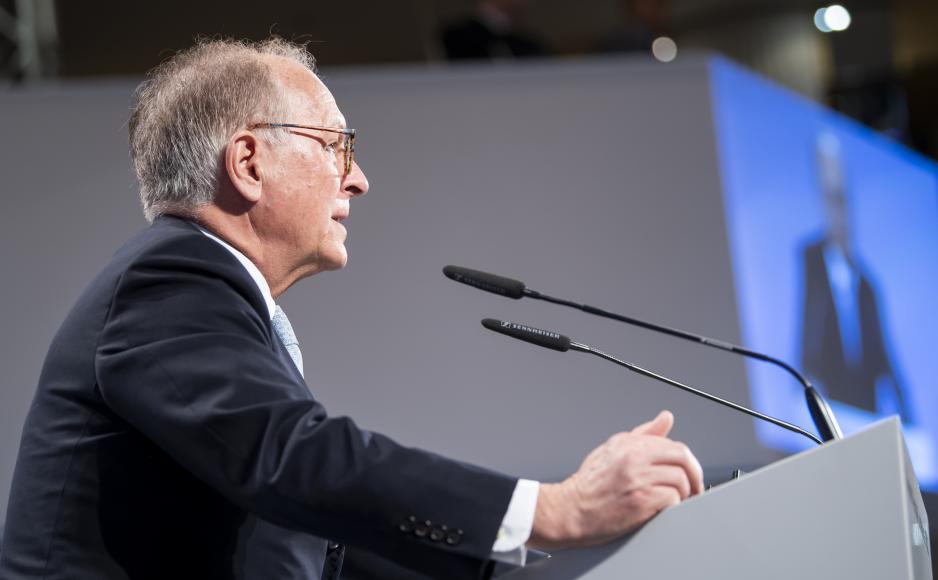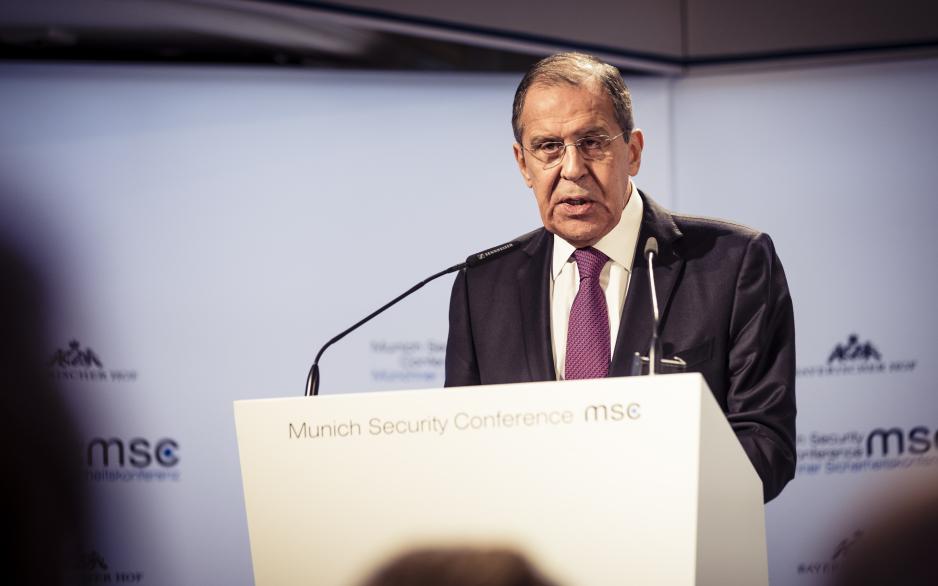Security Experts: - The World is Facing A New Era of Signifcant Power Struggles

Wolfgang Ischinger is Chairman of the international security conference in Munich and has a background as diplomat and Deputy Minister of the German government. Today, he is also affiliated with SIPRI, the Stockholm International Peace Research Institute. (Photo: MSC/Mueller)
In a recent report published in relation to the Munich security conference, experts argue that the liberal world order appears to be dissolving. – We are experiencing an epochal shift, says the conference’s chairman Wolfgang Ischinger. A new era of significant power struggle between the USA, Russia and China is now unfolding.
The global and liberal world order is dissolving. Who can make the pieces fit together again? That is one of the questions asked in an extensive report that was part of the backdrop for the annual security conference in Munich that took place recently.
The report, named “The Great Puzzle: Who Will Pick Up the Pieces”, describes today’s world – from a security policy perspective – as a by and large ruined puzzle.
Many of the discussions at the conference this year focused on a changing world order and significant changes to a.o. the USA’s foreign policy. The conference gathered everyone, from NATO Secretary General Jens Stoltenberg to hundreds of heads of state, diplomats, officers and security experts from all over the world.
- Nothing is as it once was
- The whole liberal world order appears to be falling apart – nothing is as it once was. When Vladimir Putin annexed Crimea and started the bloody conflict in Eastern Ukraine in 2014, many considered him to be the major cause of global destabilisation. Nobody could have known that just a few years later the US President, of all people, would seriously challenge the current international order. Donald Trump questions free trade just like he questions the Western set of values or NATO. This has massive consequences – not just for us Europeans.
These are the words of Wolfgang Ischinger, who has been Chairman of the Munich Security Conference for man years, in this op-ed.
Ischinger, who is a former German ambassador to the USA, argues that Trump in many ways is a symptom of change, rather than a cause thereof.
A new era – and a new time in politics
- The global security situation is more dangerous today than at any time since the collapse of the Soviet Union. We are experiencing an epochal shift; an era is ending, and the rough outlines of a new political age are only beginning to emerge. No matter where you look, there are countless conflicts and crises – crises that greatly affect us Europeans, he continues.
The report extends across more than 100 pages and has been worked out by a series of security experts from recognized institutions across the world. It presents data and analyses from some of the most prominent security policy challenges the world faces today.
It covers both terror, arms race and Syria, as well as simmering old conflicts on the African continent that are about to be reignited.
Power struggle: China, USA, Russia
China, the USA and Russia, and in particular the relationship between the latter and the West, receives wide attention in the report.
In the report’s introduction, conference manager and spokesperson Ischinger argues that the world is facing a new era with significant power struggles between these three particular states.
Also read: The Chinese Dilemma
Ischinger points out that this power struggle is accompanied by a “certain leadership vacuum” in what we know as the liberal, international world order. - While no one can tell what the future order will look like, it is becoming obvious that new management tools are needed to prevent a situation in which not much may be left to pick up, he says.

- We are confident that cooperation in the Arctic does not require a military component. I hope our partners agree to this approach, Russian Foreign Minister Sergey Lavrov said in his talk. (Photo: MSC/Kuhlmann)
Lavrov: - An extremely intense situation
Russia’s Foreign Minister Sergey Lavrov was amongst the many international top politicians attending the conference.
He started his long speech with stating that the current security situation on the European continent as well as in the Euro-Atlantic region, is extremely intense.
- There are constantly new divides surfacing, and the old ones grow deeper. I believe that given the current conditions, it is both relevant and accurate to turn to the idea of a “European home”, however strange that may sound in the present situation.
Russia’s Foreign Minister says that man top politicians in modern times have realized that it is necessary to gather “the potentials” of absolutely all European states.
- Chancellor Helmut Kohl (German Chancellor from 1982 to 1998, journ.note) and President Francois Mitterand (French president from 1981 to 1995, journ.note) also spoke about the importance of having a broadest possible partnership with Russia in light of stability and security, Lavrov says.
Also read: Lavrov comes to Kirkenes
The Foreign Minister also spoke about “NATO centrism”, and that many plans following the end of the Cold War are noble plans holding the potential to be fully implemented, however, that are today still nothing but good intentions.
Questions NATO’s intentions in the High North
When asked whether it will be possible to continue cooperations in the Arctic region despite the deteriorating relations between the East and the West, Lavrov says that the answer is an unequivocal yes from a Russian point of view,
- Of course we monitor NATO’s increased activities in the region. We have discussed this with our Norwegian partners. What are NATO’s goals in the Arctic? We want to understand that, Lavrov says in his speech, which is published in full on the Russian foreign ministry's web pages.
- When listening to the statements from the British Foreign Minister Gavin Williamson, one gets the impression that no one but NATO is allowed to have interests anywhere but within its own borders, he adds.
Also read: Russia's Ambassador warns: Missile shield will endanger Norway's borders (2017)
- We have time and again presented various constructive proposals to the Arctic Council as well as a series of regional organisations. We are confident that cooperation in the Arctic does not require a military component. I hope our partners agree to this approach, Lavrov says.
Also read: - Russia is a responsible actor in the Arctic
This article originally appeared in Norwegian and has been translated by HNN's Elisabeth Bergquist.

